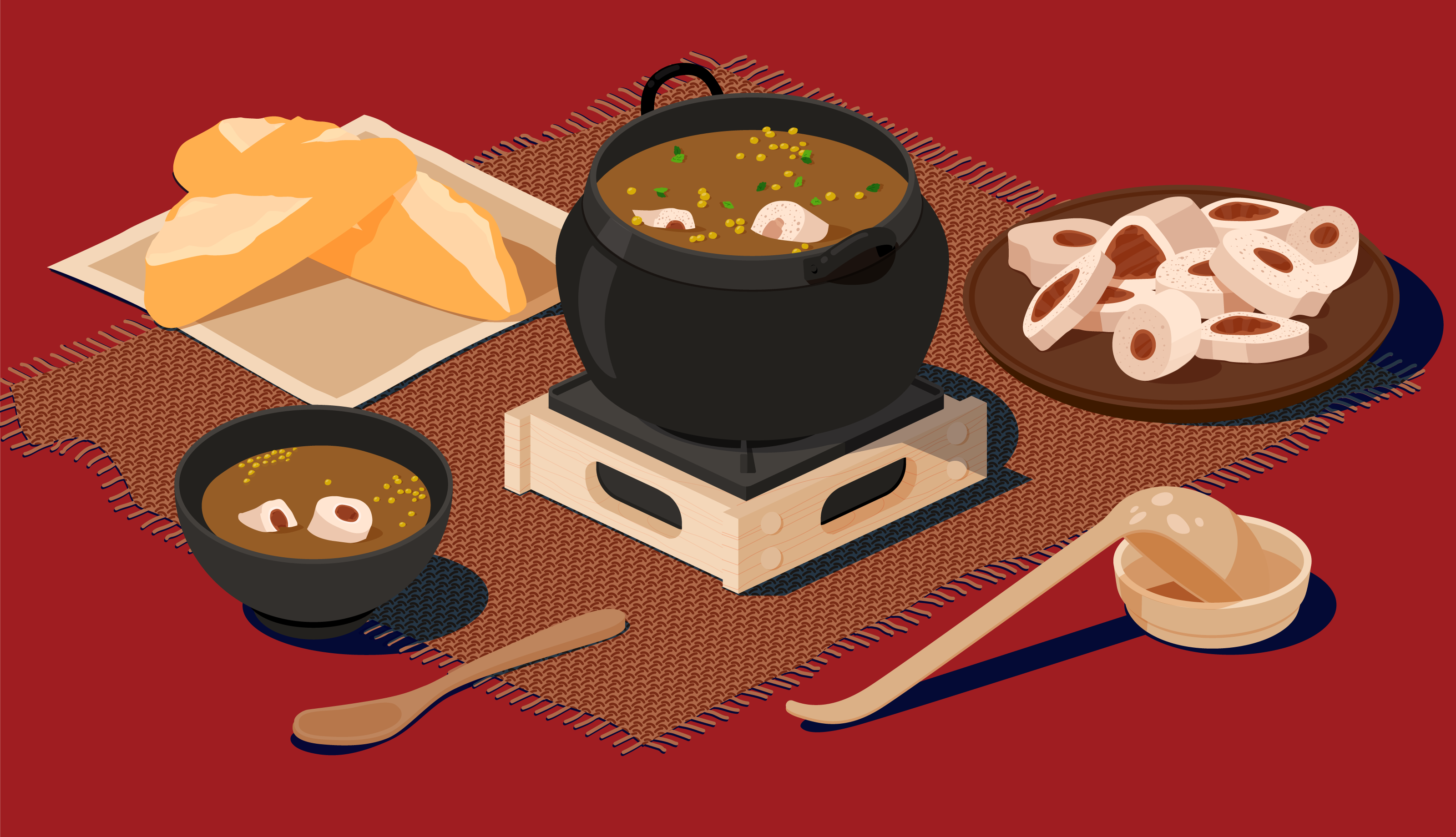In recent years, the humble bone broth has risen to superfood status, with influencers, celebrities and athletes alike praising it for its supposed health benefits. But is there any truth to these claims, and can chicken bone broth cure your ails? Make no bones about it; we’ll get to the bottom of these claims.
Bone broth has been praised for its health benefits for thousands of years and is a staple in numerous cultures. For example, traditional Chinese medicine promotes bone broth to detoxify the liver and aid digestion, whilst the father of medicine, Hippocrates, recommended it for its supposed healing properties.
In recent years, bone broth has risen to superfood status, with many claiming a steaming bowl of stock can "fix" your gut health, strengthen the immune system and even reverse the effects of ageing. These benefits are attributed to vital proteins found in bones like collagen alongside essential minerals and amino acids.
Table of contents:
- Bone broth: the newest health craze
- Superfood or superhyped?
- Are there dangers to eating bone broth?
- Takeaway
Bone broth: the newest health craze
Bone broth has boomed in popularity over the last few years, with celebrities, health movements and influencers alike praising bone-based stock as a cure-all for many ails. Prime among them is the queen of pseudoscience, Gwenyth Paltrow, who has promoted broth for its health benefits on her platforms. By 2024, experts predict that the broth market will be worth as much as $3 billion!
Beyond these endorsements, the popularity of bone broth has been driven by the rise in health movements like the paleo diet and the GAPS (gut and psychology syndrome) diet. Often referred to as the “caveman” diet, the paleo diet is based on the belief that while our nutritional intake has dramatically changed, our digestive systems have not.
With this in mind, the diet encourages followers to eat like their pre-agricultural ancestors, choosing organic meat, nuts, fruit and vegetables over processed goods. As part of this, many paleo-based websites promote bone broth as an elixir of health which can be drunk in place of coffee or sugary tea.

Superfood or superhyped?
Many of the supposed health benefits assigned to bone broth are attributed to the collagen found in bone and cartilage. Collagen is the most abundant protein found in the human body and is used to make connective tissue in the body. It is a large component in bone, skin, muscle and tendons. As we age, our body begins to produce less collagen, a process that is accelerated by smoking, lack of sleep, sedentary lifestyle and excess drinking.
Collagen is known to support the health of our skin, nail and hair, all of which are important elements of our appearance. Considering bones contain collagen, many make the leap that sipping broth is the best way to increase collagen levels and fight the ageing process.
Whilst bone broth contains some precursors to make collagen, we do not simply absorb collagen from the broth into the human body. When we consume dietary collagen, it is broken down into amino acids and then transported to wherever protein is needed most in the body. Whilst this might help our body produce some collagen, many other foods do so just as well, including:
- eggs
- meat
- fish
- dairy
- legumes
- soy
These foods contain three amino acids: glycine, proline and hydroxyproline. These are all precursors to collagen and assist in its production. In fact, collagen isn’t even the best source of these necessary amino acids.
Continuing, let’s address the claim that bone broth can “heal a leaky gut” and minimise inflammation. First and foremost, the idea of “superfoods” is fundamentally flawed, and anyone claiming one single ingredient will “fix” or “heal” your ails is lying. There is no single food that can heal your gut health or compensate for poor lifestyle choices. To date, all the research we have says that good health is borne of a balanced diet in combination with an active lifestyle.
There is far more robust evidence that a diet rich in a variety of plant-based foods can fuel the production of butyrate, a short-chain fatty acid known to strengthen the gut lining and reduce inflammation. In light of this, you would be far better off eating a variety of insoluble, plant-based fibre than sipping on bone broth!
As for bone broth’s anti-inflammtory properties, the evidence is severely lacking. In a study published last year, bone broth reduced inflammation in mice models who had ulcerative colitis. Whilst compelling, animal studies simply don’t carry the weight of human trials, particularly when there are so few of them to evaluate.
I could only find one relevant human study other than this isolated animal study. The paper was published in 1978 and compares chicken noodle soup to hot and cold water in congestion treatment. The paper concludes that chicken noodle soup is more effective at reducing congestion than hot or cold water alone. Researchers noted that the participants also appeared to experience a slight reduction in inflammation.
However, the study has its limitations and in no way conclusively supports the benefits of bone broth; researchers noted that the chicken broth contained a variety of vegetables, including parsnips, leeks, carrots, celery, sweet potato and parsley. Due to this wide range of ingredients, It is hard to assign the effects solely to the chicken bones.
☝Did You Know?☝ The 12th-century physician Maimonedes prescribed chicken bone broth as a medicine for both asthma and leprosy!
Are there dangers to eating bone broth?
Bones are known to contain certain heavy metals, namely cadmium and lead, which can be toxic in high amounts. In a 2013 study published in the UK, researchers found that an organic chicken bone broth contained several times more lead than a broth made out of chicken meat alone. Whilst these levels are high, The Harvard School Of Public Health notes that this is still less than half the permitted amount in drinking water.
In a 2017 study, researchers tested three different bone broths, both homemade and commercial, to measure the lead and cadmium levels. They found that the levels did not exceed 5% of the daily recommended amounts and presented a minimum risk. This is a reminder that the nutritional value of bone broth will vary according to which bones you use, the length of time you boil them and which ingredients you add to the stock.
☝Reminder☝ Any broad health claims about the health benefits of bone broth are likely to be misleading. This is owing to the variablity in each broth, including cooking time, type of bone and added ingredients
Takeaway

To conclude, whilst bone broth can be a part of a healthy, balanced diet, it isn't quite the elixir of health that some have made it out to be. What’s more, just because bones contain collagen doesn’t mean we can simply absorb this by drinking bone broth. In reality, the body breaks down bone broth into amino acids that support collagen production. However, this isn’t exclusive to bone broth, nor is bone broth the best source of these amino acids.
For example, amino acids can be acquired in higher amounts from many other foods such as eggs, poultry, legumes, fish and soy. The good news is that you can add these ingredients to your bone broth to increase its nutritional properties. As for gut health, there is very little research supporting the claims that bone broth can “heal your gut” or aid digestion.
With that being said, a bone broth can be a great way to consume more prebiotic vegetables. For example, one of my favorite meals during the winter is a steaming bowl of pho packed full of herbs, greens and spices!
In short, there is nothing wrong with enjoying a bowl of bone broth in moderation, but just remember it isn’t a magic bullet for your gut, skin or joint health! For those worried about collagen levels, you can support the production of this protein by eating a balanced diet full of fish, meat, whole grains, legumes and a variety of plant-based fibre. Lastly, be mindful of the sodium levels in bone broth, especially when buying store-bought broths.
☝️DISCLAIMER☝This article is for informational purposes only. It is not intended to constitute or be a substitute for professional medical advice, diagnosis, or treatment.
















